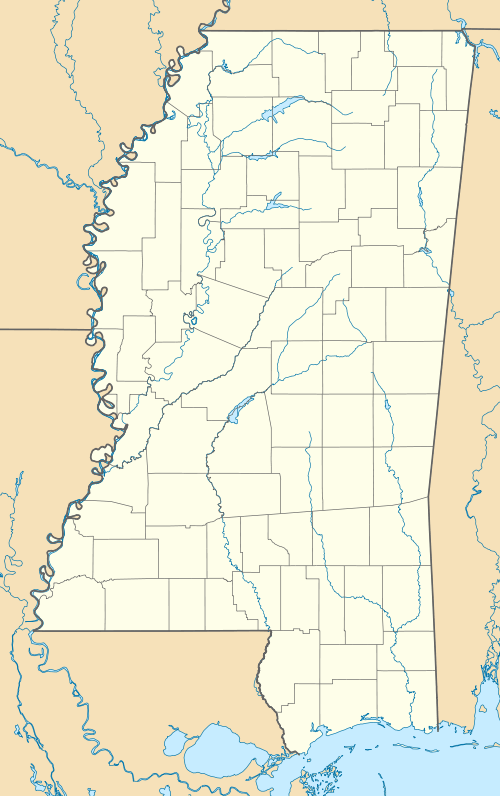Grand Gulf Nuclear Generating Station
| Grand Gulf Nuclear Generating Station | |
|---|---|
 Location of Grand Gulf Nuclear Generating Station in Mississippi | |
| Country | United States |
| Location | Claiborne County, near Port Gibson, Mississippi |
| Coordinates | 32°0.4′N 91°2.9′W / 32.0067°N 91.0483°WCoordinates: 32°0.4′N 91°2.9′W / 32.0067°N 91.0483°W |
| Status | Operational |
| Commission date | July 1, 1985 |
| Owner(s) |
Entergy (90%) South Mississippi Electric Power Association (10%) |
| Operator(s) | Entergy |
| Nuclear power station | |
| Reactor type | BWR-6 |
| Reactor supplier | General Electric |
| Cooling source | Mississippi River |
| Cooling towers | 1 |
| Power generation | |
| Units operational | 1 x 1,500 MWe Siemens |
| Average generation | 1.2 TWh |
|
Website www.entergy-nuclear.com/... /grand_gulf.aspx | |
Grand Gulf Nuclear Station has one sixth-generation General Electric boiling water reactor. It lies on a 2,100 acres (850 ha) site near Port Gibson, Mississippi. The site is wooded and contains two lakes. The plant has a 520-foot natural draft cooling tower.
Grand Gulf's reactor is the most powerful in the United States, with a core power of 4408 MWth[1] yielding a nominal gross electrical output of about 1500 MWe.
Grand Gulf is operated by Entergy, which also owns 90% of the station through their subsidiary, System Energy Resources Inc. The other 10% is owned by South Mississippi Electric Power Association.
Units 2 and 3
Adjacent to the operating Grand Gulf station, is an unfinished concrete structure that was to be the containment for Unit 2, a twin to the existing Unit 1. In December 1979, staggered by construction cost, Entergy (then called Middle South Utilities) stopped work on Unit 2.
On September 22, 2005, it was announced that Grand Gulf had been selected as the site for a GE ESBWR reactor. For details, see Nuclear Power 2010 Program. This was to be Unit 3.
In 2007, the U.S. Nuclear Regulatory Commission (NRC) issued an Early Site Permit (ESP) to Grand Gulf.[2] In 2008, Entergy and NuStart submitted a Combined Construction and Operating License (COL) application for a potential new nuclear unit at the Grand Gulf.[3]
On January 9, 2009, Entergy indefinitely postponed work towards the license and construction of Unit 3. In September 2015 the NRC withdrew the COL for the ESBWR unit, at the request of Entergy.[4]
Surrounding population
The Nuclear Regulatory Commission defines two emergency planning zones around nuclear power plants: a plume exposure pathway zone with a radius of 10 miles (16 km), concerned primarily with exposure to, and inhalation of, airborne radioactive contamination, and an ingestion pathway zone of about 50 miles (80 km), concerned primarily with ingestion of food and liquid contaminated by radioactivity.[5]
The 2010 U.S. population within 10 miles (16 km) of Grand Gulf was 6,572, a decrease of 18.6 percent in a decade, according to an analysis of U.S. Census data for msnbc.com. The 2010 U.S. population within 50 miles (80 km) was 321,400, a decrease of 0.4 percent since 2000. Cities within 50 miles include Port Gibson (5 miles to city center), Vicksburg (25 miles).[6] Alcorn State University is 25 miles southwest of the plant.
Seismic risk
The Nuclear Regulatory Commission's estimate of the risk each year of an earthquake intense enough to cause core damage to the reactor at Grand Gulf was 1 in 83,333, according to an NRC study published in August 2010.[7][8]
Release of low levels of tritium into Mississippi River
After heavy rains in late April, 2011, workers were pumping standing water that had collected in the abandoned, never-completed Unit 2 turbine building into the Mississippi River. Detectors sounded alarms at the presence of tritium in the water, and the pumping was stopped, and the accidental release was reported to the Mississippi Health Department and to the NRC. As of the dates of the news reports, it was unknown both how much tritium had entered the river, and how the tritium had collected in the standing water, given that Unit 2 was not an operational reactor, had never been completed. It is unknown how much tritium entered the river, because samples were not taken at the time of the leak. The NRC is investigating to find the source of the leak.[9][10][11]
See also
- US energy policy
- Energy Policy Act of 2005 (plans before 2009 were influenced by the energy policy of George W. Bush)
- Entergy Nuclear - Grand Gulf Nuclear Station
- NRC environmental assessment related to the Grand Gulf extended power uprate
- NRC environmental assessment related to Grand Gulf’s license renewal
Notes
- ↑ "Approved applications for EPU". U.S. NRC. 2012-09-25. Retrieved 2012-12-04.
- ↑ "Second US site gains new build permit". World Nuclear News. 2007-03-28. Retrieved 2008-08-29.
- ↑ "New COL filed; other US applications progressing". World Nuclear News. 2008-02-28. Retrieved 2008-08-29.
- ↑ "US Entergy formally drops ESBWR application". Nuclear Engineering International. 24 September 2015. Retrieved 24 September 2015.
- ↑ http://www.nrc.gov/reading-rm/doc-collections/fact-sheets/emerg-plan-prep-nuc-power-bg.html
- ↑ Bill Dedman, Nuclear neighbors: Population rises near US reactors, msnbc.com, April 14, 2011 http://www.msnbc.msn.com/id/42555888/ns/us_news-life/ Accessed May 1, 2011.
- ↑ Bill Dedman, "What are the odds? US nuke plants ranked by quake risk," msnbc.com, March 17, 2011 http://www.msnbc.msn.com/id/42103936/ Accessed April 19, 2011.
- ↑ http://msnbcmedia.msn.com/i/msnbc/Sections/NEWS/quake%20nrc%20risk%20estimates.pdf
- ↑ Associated Press via Picayune Item, "Grand Gulf checks leak of tritium to Miss. River", May 11, 2011 http://picayuneitem.com/statenews/x1693504837/Grand-Gulf-checks-leak-of-tritium-to-Miss-River Accessed May 12, 2011
- ↑ "Tritium released by Grand Gulf still not measured", Sun Herald, May 11, 2011 http://www.sunherald.com/2011/05/09/3096784/tritium-released-by-grand-gulf.html Accessed May 12, 2011
- ↑ "Radioactive water released into river at Grand Gulf", Natchez Democrat, May 4, 2011 http://www.natchezdemocrat.com/2011/05/04/radioactive-water-released-into-river-at-grand-gulf/ Accessed May 11, 2011
External links
- "Grand Gulf Nuclear Power Plant, Mississippi". U.S. Department of Energy (DOE). April 26, 2012. Retrieved 2014-08-16.
- "Grand Gulf 1". Operating Nuclear Power Reactors. U.S. Nuclear Regulatory Commission (NRC). 2008-02-14. Retrieved 2008-11-14.
- "Grand Gulf, Unit 3 Application". New Reactors. NRC. November 12, 2008. Retrieved 2008-11-14.